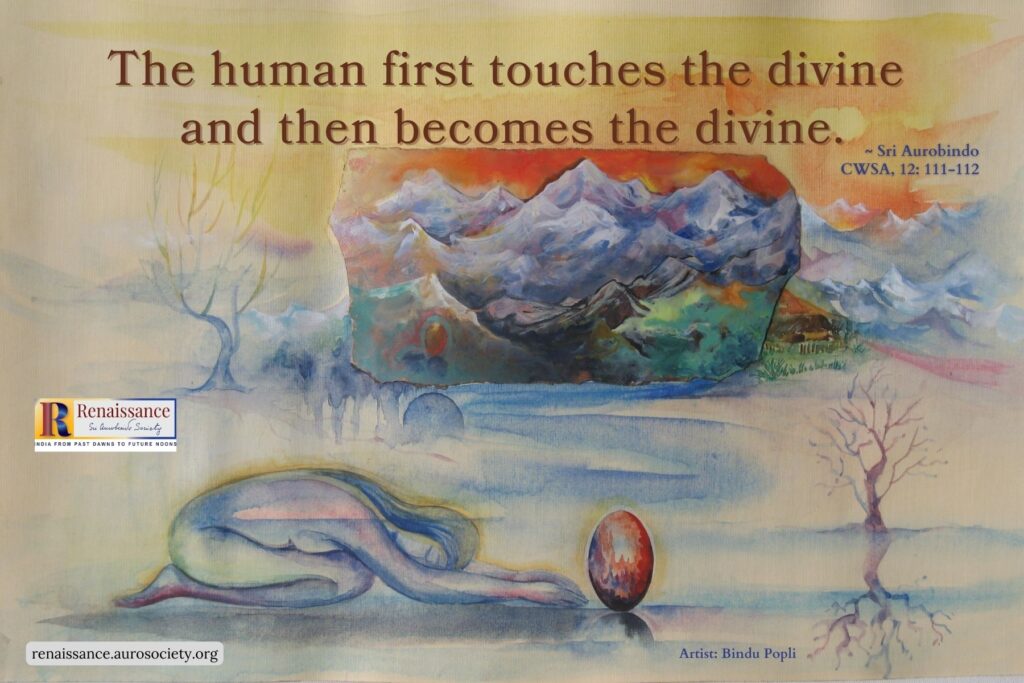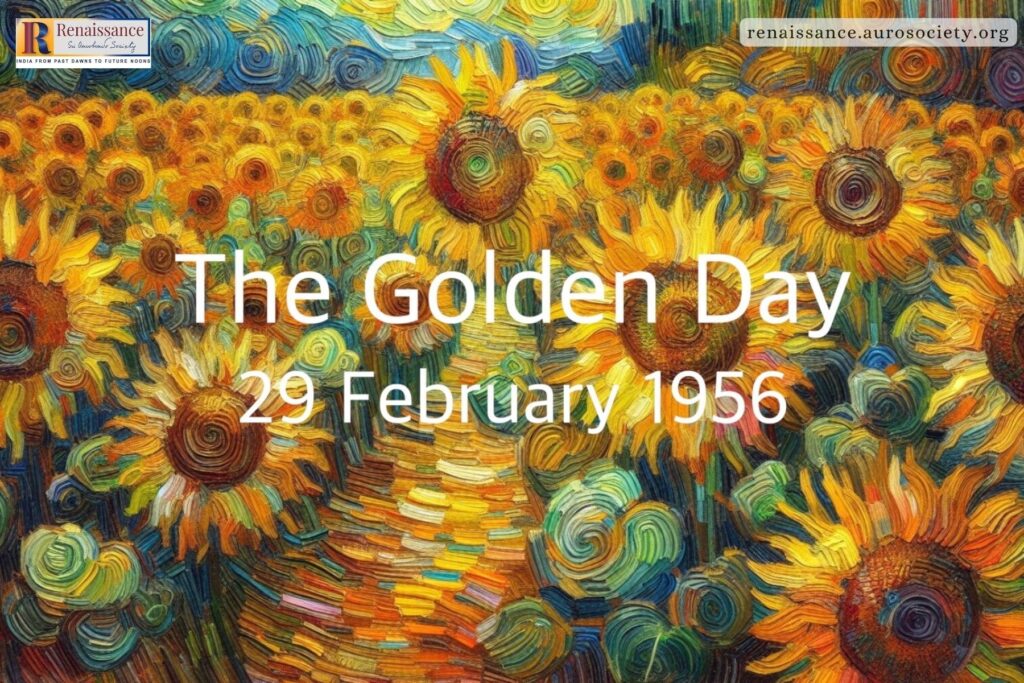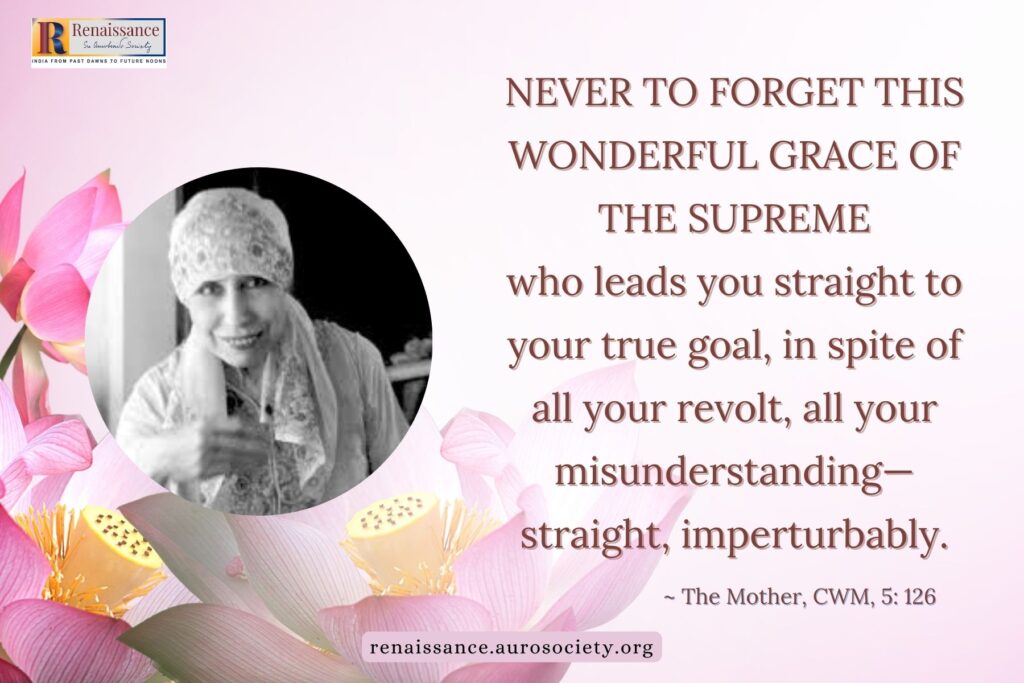Continued from Part 2

PART 3
The core of Sri Aurobindo’s philosophy and Yoga is the dynamic Truth-consciousness that is the Supermind.
By “Truth-consciousness” is meant that status and force of the Divine which brings out of the Divine’s absolute Transcendence into a perfect manifestation of Self-being and Self-becoming the potentialities of the play of the One who is at the same time the Many.
This manifestation is a complete harmony in which exist and function the creative truths, the flawless originals, the golden archetypes of all that is in our imperfect cosmos in which the Divine has posited a difficult evolution of matter, life-force and mind—with a soul supporting them—out of a vast Inconscience, a primal darkness set by Him as the nether pole to the transcendent Absolute.
Between the two poles and above the evolving earth and below the archetypal Supermind are various occult planes—Subtle Matter, Vitality, Mind, Overmind and, at the back of the first trio, Psyche—with their beings and movements and there is a complex interaction in the whole system of cosmos on cosmos.
What the Ancients Lacked
All this was known in general to the ancient seers and they saw in man who is the microcosm a threefold reality concretised into what they termed three sheaths or shariras,—the gross outer, the subtle inner, the causal higher. The last is the substance of the Super-mind, compacted of its creative light of total knowledge, infinite power, immortal bliss.
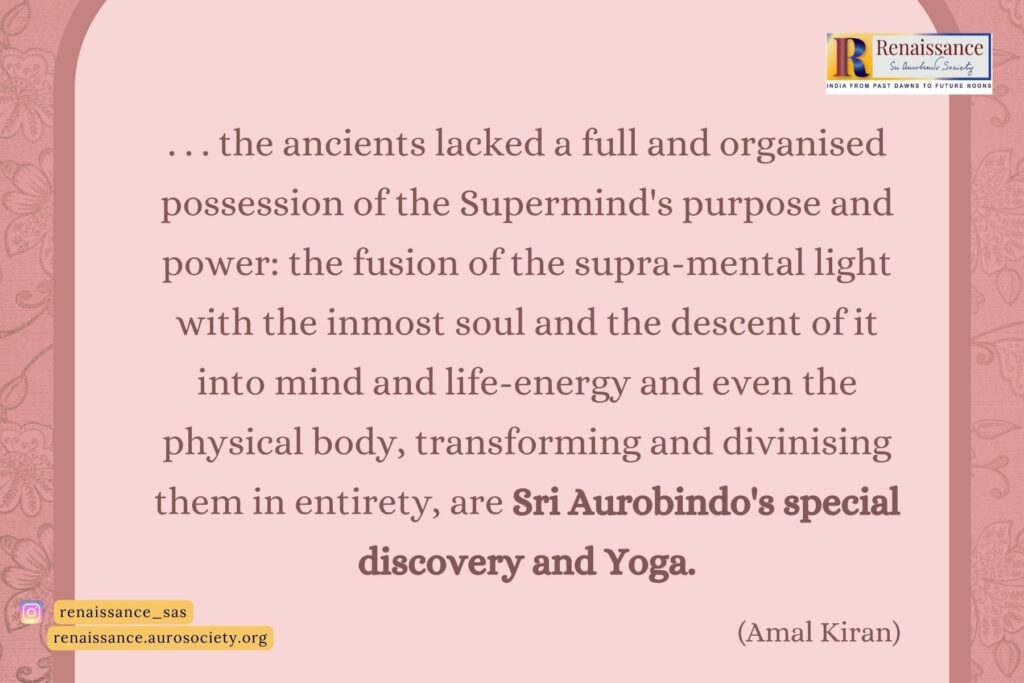
But the ancients did not realise that the earthly evolution is not meant only to release the being into the Cosmic Self and into ever more deep, ever more high poises of consciousness and into some eternity beyond birth and death but also to bring into earth-terms the dynamic modes of the widths, the depths and the heights and ultimately the supreme perfection of the Truth-plane—the kârana sharira, the causal body—so that earth-terms themselves may be fulfilled and not merely serve as bright points of departure into the wide and the deep and the high.
In short, the ancients lacked a full and organised possession of the Supermind’s purpose and power: the fusion of the supra-mental light with the inmost soul and the descent of it into mind and life-energy and even the physical body, transforming and divinising them in entirety, are Sri Aurobindo’s special discovery and Yoga.
An Initiating Double Centre for the New Humanity
With the supramental descent Sri Aurobindo aimed at creating a new humanity enjoying true self-consummation and living divinely in every field. And it is with this aim that he sought to form an initiating double centre for the new humanity by his own supramentalisation and the Mother’s.
Supramentalisation involves, among its final elements freedom from disease, duration of life at will and a change in the functionings of the body—all, of course, as a material expression of the divine nature emerging in the human and not as an outer aggrandisement of an expanding inner egoism. But to compass these final elements which alone would found with utter security a supramental earth-existence the Yogi has to tackle at last the bedrock of the Inconscience, the dark basis of the submerged Divine from which evolution seems to issue.
Sri Aurobindo and the Mother, taking upon themselves as representative pioneers the agelong difficulties of all human nature, have been striking against this bed-rock for the last decade and a half.
“No, it is not with the Empyrean that I am busy,” wrote Sri Aurobindo in 1936 to a disciple and added:
“I wish it were. It is rather with the opposite end of things—in the Abyss that I have to plunge to build a bridge between the two. But that too is necessary for my work and one has to face it.”
(CWSA, Vol. 35, p. 360)
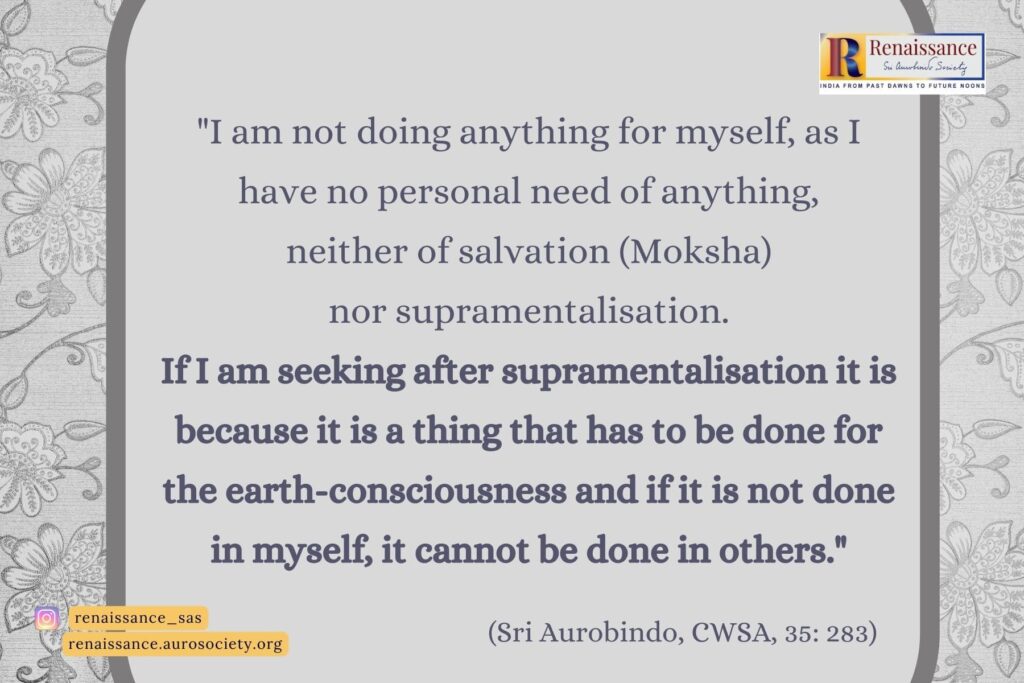
Immense are His Trials
In the course of this plunge, as layer after layer of the occult Inconscient is torn open and the supramental light sought to be called down into it, various dreadful possibilities rise up and great inner wounds as well as severe bodily tensions have to be endured. But throughout the fight the Master of the Supermind carries the talisman, as it were, that can ward off the fatal blow.
Immense, in spite of the sublimest light within his very body, are his trials and yet he has also the capacity to emerge finally the victor and blaze a path of ultimate triumph for the men who follow him. Thus to emerge had been Sri Aurobindo’s plan, so far as the plan can be read through his philosophical writings and his personal letters. Both the plan and the non-egoistic worldwide attitude of an Avatar find voice in a letter of 1935:
“I have no intention of achieving the supramental for myself only—I am not doing anything for myself, as I have no personal need of anything, neither of salvation (Moksha) nor supramentalisation. If I am seeking after supramentalisation, it is because it is a thing that has to be done for the earth consciousness and if it is not done in myself, it cannot be done in others.”
(CWSA, Vol. 35, p. 283)
Yes, Sri Aurobindo, in his published pronouncements, appears to have envisaged the need and therefore the prospect of himself constituting together with the Mother the starting-point of supramental humanity. But in the same pronouncements he leaves also a small margin for a different dénouement.
A letter of 1934 speaks in general about the ways of a vessel of God:
“The Divinity acts according to the consciousness of the Truth above and the Lila below and It acts according to the need of the Lila not according to men’s ideas of what It should do or should not do.”
(CWSA, Vol. 28, p. 475)
A clearer hint of unexpected turns in the Divine’s dealings is contained in a letter of 1935:
“Why the immortal Hell should the Divine be tied down to succeed in all his operations? What if failure suits him better and serves better the ultimate purpose? . . . What rigid primitive notions are these about the Divine!
(CWSA, Vol. 35, p. 404)
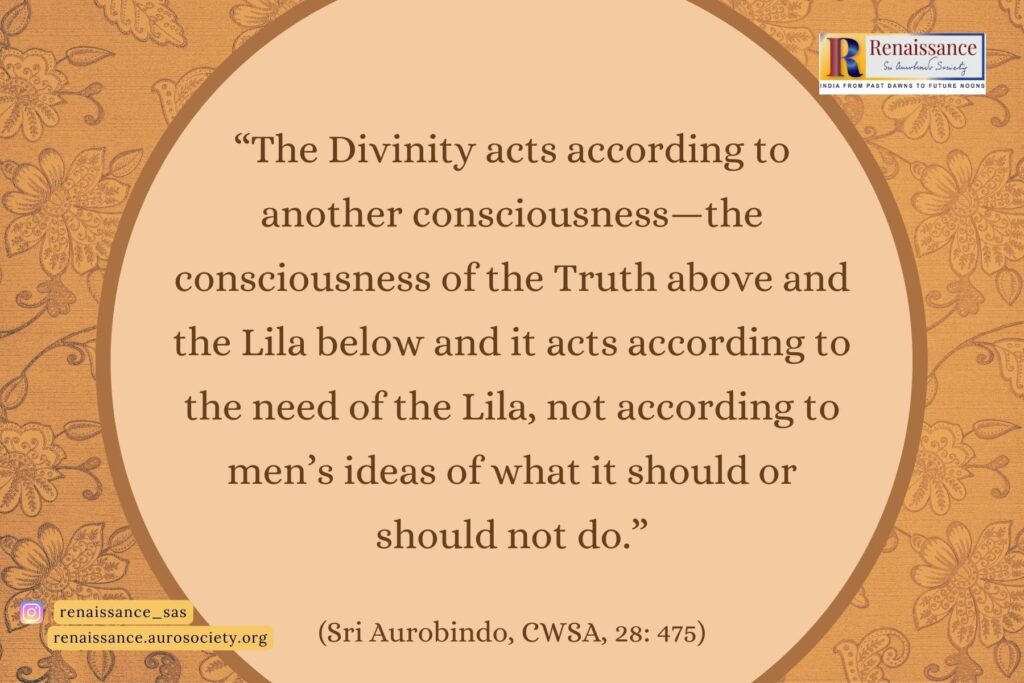
A Paradoxical Strategy
This suggests that apparent defeat of the Divine’s grandest goal could even be a concealed victory, a way precisely to reach that goal with greater swiftness by means of a paradoxical strategy. And, all conditions considered, it is truly such a strategy that seems to have been employed by Sri Aurobindo when to the superficial gaze he succumbed to a renal disorder.
The whole supramental Yoga was indeed like a great general’s campaign against forces that had never been combated before by any spiritual figure. In the teeth of every common experience, every posture of human living down the ages, even every articulate spiritual tradition, this Yoga hoped to change the very foundations of Matter and proceeded into an embattled darkness.
Only a fearless fighter like Sri Aurobindo, only a genius like him of the Spirit militant could have intuited the mighty secret of the epiphany in evolution and planned the transformative onslaught on established nature and moved ahead in the frame of mind that is disclosed in yet another letter of 1935:
“It is not for personal greatness that I am seeking to bring down the supermind. I care nothing for greatness or littleness in the human sense. . . If human reason regards me as a fool for trying to do what Krishna did not try, I do not in the least care. There is no question of C or D or anybody else in that. It is a question between the Divine and myself—whether it is the Divine Will or not, whether I am sent to bring that down or open the way for its descent or at least make it more possible or not. Let all men jeer at me if they will or all Hell fall upon me if it will for my presumption,—I go on till I conquer or perish. This is the spirit in which I seek the supermind, no hunting for greatness for myself or others.”
(CWSA, Vol. 35, pp. 281-282)
A Splendid Heroism
A splendid heroism of selflessness is here, the vividest picture of a warrior Yogi who would take any risk, if thereby he could press closer to his objective and though the formula is “I conquer or perish” the frame of mind is one that might easily avail itself of a yet more audacious formula: “I perish to conquer.”
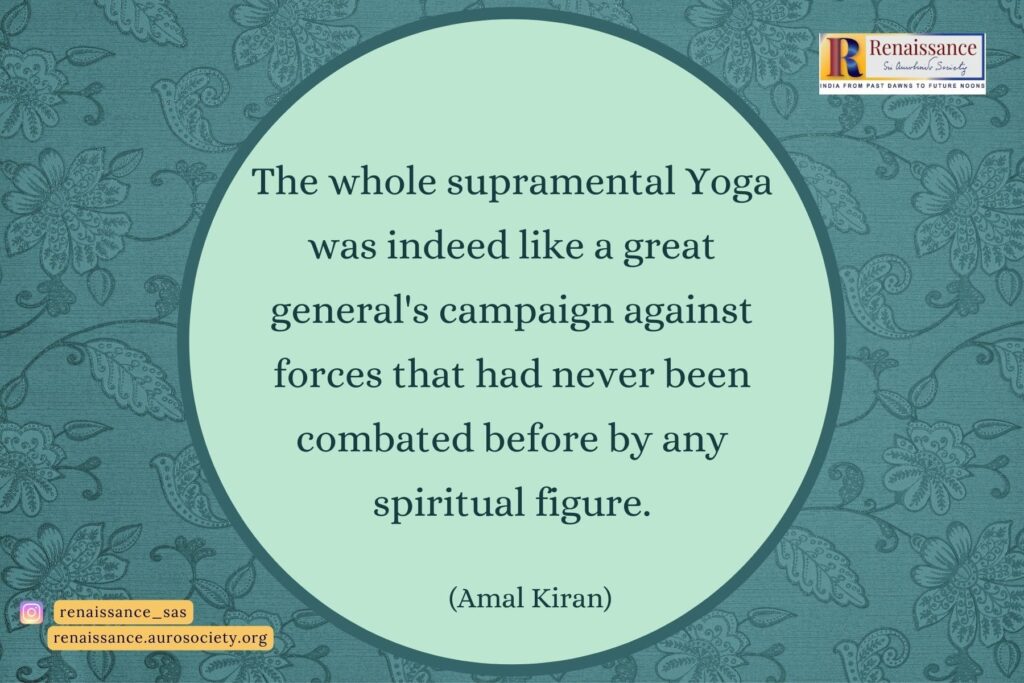
To embrace this formula what would be required is simply the sense that, by sacrificing in a final grapple with the black powers of the Inconscient a wonderful body tinged with supramental light, those powers would be terribly exhausted and the golden godhead above tremendously pulled towards earth and into this body’s partner in the Yoga of the Supermind.
As soon as the momentous sense would dawn, Sri Aurobindo would be ready—supreme general that he was—to alter his entire scheme of battle, relinquish his whole line of previously prepared forts, abandon the old method of advance, change suddenly his well-plotted direction and, instead of attempting to supramentalise his physical existence in every detail, move imperturbably towards some titanic ambush, cast away the very guard given him by the Supermind and go down fighting to win all in secret, while losing all on the surface.

Continued in Part 4
Read: PART 1, PART 2
~ Graphic design: Beloo Mehra & Biswajita Mohapatra

